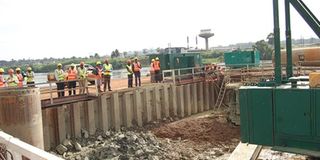New Nile bridge on course - Unra

Construction at the New Nile Bridge in Jinja District recently. PHOTO BY DENNIS EDEMA
What you need to know:
Progress. The roads body says works on the Jinja bridge will continue despite the row between contractors.
Jinja. The Uganda National Roads Authority (Unra) has indicated that the row between two South Korean sub-contractors over the supply of mobile concrete machines at the New Nile Bridge site in Jinja District will not halt the ongoing construction of the bridge.
Unra’s senior manager for bridges and structures, Mr Lawrence Pario, told Daily Monitor that so far, 21 per cent of works on the project has been completed and will continue according to schedule.
“Progress of works is expected to increase rapidly as high value and volume of works on superstructure pylons, stay cables and bridge deck are to start at the two completed abutments and pylon at Njeru side,” Mr Pario said in an email.
The Shs391 billion (about $130m) bridge is planned to be 525 metres long, 22.9 metres wide, with two abutments and two 70-metre high pylons. The project was contracted to Japanese firms, Zenitaka-Hundai Joint Venture.
Daily Monitor reported last week the two Korean sub-contractors, Kamkung Plant Industry Company Limited and Prism Construction Company were locked in court battles over contract breach claims, a row which had threatened works on the project.
According to documents, Kamkung sued Prism Construction at the Jinja High Court seeking an order to restrain it from using the standby batching machines it supplied on the site over alleged breach of contract. Prism Construction was contracted in 2014 to provide concrete on the site. The firm, however, is said to have also gone into agreement with Kamkung for supply of a mobile concrete batch machine for mixing of concrete at a cost of Shs980 million (about $270,000).
The batching machine is manufactured by Kamkung. In the suit, Kamkung claims it installed the machine upon receiving a down payment $210,000 ( about Shs706m) on the understanding the balance would be paid once the machine has been fully installed. However, Prism’s managing director Kim Yong Joon argued it is Kamkung who breached the contract by supplying a substandard mobile concrete batch machine.
The machine’s production capacity, Mr Joon said, is 20 cubic metres of concrete per hour instead of the 90 cubic metres per hour as agreed. He also claimed the machine had been ridden with mechanical deficiencies which Kamkung had refused to address.
However, Unra clarified that the current hourly output of each batching plant is between 20-30 cubic metres per hour because the concrete consumption for construction of piles and pile cap are low. “The alleged under capacity is therefore not true,” Mr Pario noted.



